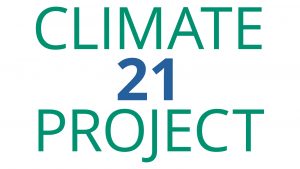 This is a brief review of the recently released “Climate 21 Project” policy memo. It is the work of many former members of the Obama Administration who are deeply concerned about climate change and what steps the new administration can take in the first 100 days to confront a problem. Offering “actionable advice” rather than a policy agenda, the group recognizes that Congress must do its part by providing new statutory authorities within the early days of the new administration, and the President must be prepared to aggressively exercise the powers of his office. As the members of the Group see it, there are four interlocking crises facing the President: (a) the COVID-19 pandemic; (b) the economic devastation visited upon many people by the pandemic; (c) racial injustice; and (d) accelerating threats posed by climate change.
This is a brief review of the recently released “Climate 21 Project” policy memo. It is the work of many former members of the Obama Administration who are deeply concerned about climate change and what steps the new administration can take in the first 100 days to confront a problem. Offering “actionable advice” rather than a policy agenda, the group recognizes that Congress must do its part by providing new statutory authorities within the early days of the new administration, and the President must be prepared to aggressively exercise the powers of his office. As the members of the Group see it, there are four interlocking crises facing the President: (a) the COVID-19 pandemic; (b) the economic devastation visited upon many people by the pandemic; (c) racial injustice; and (d) accelerating threats posed by climate change.
Accordingly:
- The Executive Office of the President must take stronger steps to reduce greenhouse gas emissions through domestic investment, rulemakings, policy changes, and international diplomacy. A new Special Assistant for Climate Change must be created to take charge of these climate change initiatives. There should also be established in the Executive Office of the President a National Climate Change Council. All agencies must be advised of the urgency of this problem. The paper seems to envision a substantial growth in the White Hose staff.
- OMB. This body is responsible for critical budget, regulatory and management decisions to be made in the first 100 days. It is recommended that the Congressional Review Act should be used wherever possible to revoke unpopular new rules. The OIRA office should take measures to reinstate the concept of the “social cost of carbon” as well as developing social justice metrics.
- EPA. The new administration must reinvigorate the dedicated career staff at EPA. At EPA, the three pillars of climate change policy are described as emissions reductions, climate diplomacy, adaptation and resilience. An Environmental Council should be created at EPA.
- Department of the Interior. This department poses a challenge to this policy because the Interior Department’s historic mission has been to protect and exploit our natural resources. A stiffer mitigation policy will require a “shift” in the staff’s “understanding of their jobs and missions”. A DOI Climate Council must be established to set goals for net GHG emissions generated onshore and offshore. Onshore oil and gas leasing must be halted or slowed, and new offshore leasing ventures should be limited. DOI should enhance the use of federal lands for carbon sequestration. BLM Headquarters should return to Washington.
- Department of Energy. Because every new Secretary of Energy must spend a lot of time on getting familiar with the Department’s nuclear energy responsibilities, the new Secretary must receive an early briefing on climate change policy. A “climate strike team” should be created within the Department to focus attention on “hot button” issues, and the Department’s respected R &D capabilities should be expanded to include climate change issues.
- Department of Agriculture. It is noted that agriculture and forest resources account for a significant percentage of GHG emissions nationally, which must be managed. However, proposed regulatory reforms and changes may be met with a ”climate skepticism” in rural America which must be managed. Other issues confronted by this department include diversity, inclusion and environmental justice.
- Department of Transportation. The transportation sector is the largest contributor of GHG emissions in the United States. It is suggested that the policy should be to accelerate the electrification of transportation systems. It is also recommended that a DOT Climate Council be created within the Department.
- Department of State. The United States should rejoin the Paris Agreement. State’s diplomatic skills should be helpful in this area. A special Climate Change envoy should be appointed.
- Department of Justice. Environmental enforcement must be reinvigorated. The Group suggests that a special environmental transition team should coordinate with DOJ. The paper seems to suggest that some litigation should prioritize cases with a climate change nexus.
- NOAA. This agency provides massive amounts of scientific information, and NOAA should extend its provision of such data to GHG issues.
- Department of the Treasury. The department has global financial responsibilities, and there should be a realization that appropriate climate change policies can spur economic growth and resilient financial markets.
- Personnel Hiring. The new administration will work with a demoralized federal workforce. New alliances with the workforce must be established, and any recent government appointees that have “burrowed” into the ranks should be identified if their management responsibilities could hinder the success of this new climate change policy.
 Gravel2Gavel Construction & Real Estate Law Blog
Gravel2Gavel Construction & Real Estate Law Blog


